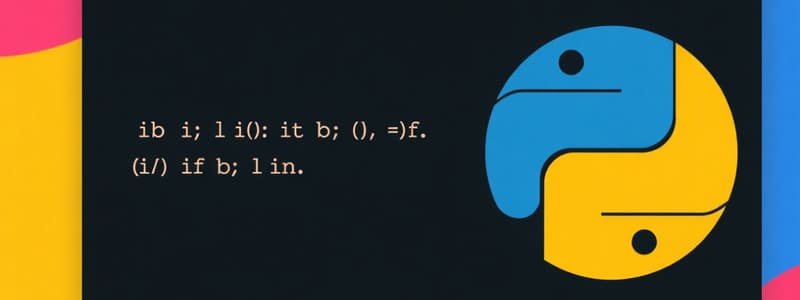Podcast
Questions and Answers
Which keywords are used for control flow in Python?
Which keywords are used for control flow in Python?
- while
- for
- elif (correct)
- if (correct)
The indentation system is not important in Python.
The indentation system is not important in Python.
False (B)
What is the purpose of an if statement?
What is the purpose of an if statement?
To execute code only when a particular condition is met.
In Python, control flow utilizes the keywords _____ and _____ for alternative conditions.
In Python, control flow utilizes the keywords _____ and _____ for alternative conditions.
Match the following control flow components with their descriptions:
Match the following control flow components with their descriptions:
What keyword is used to start a conditional statement in Python?
What keyword is used to start a conditional statement in Python?
What is the purpose of the 'elif' keyword in Python?
What is the purpose of the 'elif' keyword in Python?
What does the 'else' keyword do in a conditional statement?
What does the 'else' keyword do in a conditional statement?
The indentation in Python is optional for control flow statements.
The indentation in Python is optional for control flow statements.
In Python, the syntax of an if statement ends with a ___
In Python, the syntax of an if statement ends with a ___
Which of the following keywords are used in Python for control flow?
Which of the following keywords are used in Python for control flow?
Flashcards are hidden until you start studying
Study Notes
Control Flow
- Python uses keywords like if, elif, and else to control the flow of logic in code.
- This allows specific code to execute only when a condition is met.
- Example: If a dog is hungry, then feed the dog.
Indentation
- The indentation system is crucial to Python and helps distinguish it from other programming languages.
- Colon (:) is used to indicate the start of a code block.
- The code that follows the colon must be indented to work.
if Statement
- Example:
if some_condition: # execute some code
if-else Statement
- Example:
if some_condition: # execute some code else: # do something else
if-elif-else Statement
- Example:
if some_condition: # execute some code elif some_other_condition: # do something different else: # do something else
Lecture 4: Python Statements Part 1
- Control Flow is used to execute code under specific conditions
- if, elif, else statements are used to control code flow based on specific conditions
- Colon (:) and indentation are crucial parts of Python syntax, separating code blocks
- Indentation is the use of whitespace (отступы) to clearly define code blocks
- if statement executes code if a specific condition is met. Syntax:
if some_condition:
# execute some code
- else statement executes code if the condition in the if statement is not met. Syntax:
if some_condition:
# execute some code
else:
# do something else
- elif statement allows for multiple conditions to be checked. Syntax:
if some_condition:
# execute some code
elif some_other_condition:
# do something different
else:
# do something else
Studying That Suits You
Use AI to generate personalized quizzes and flashcards to suit your learning preferences.




